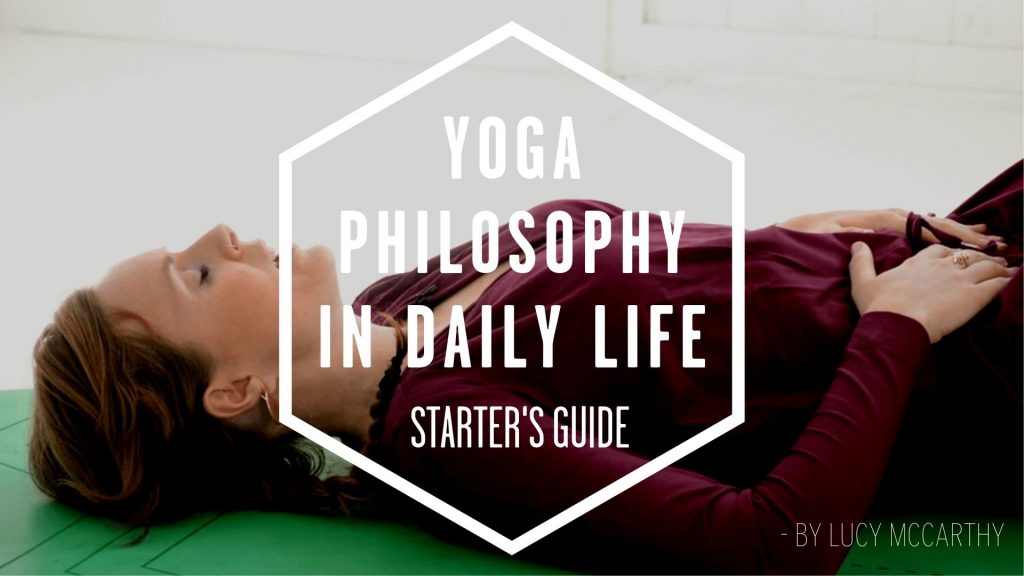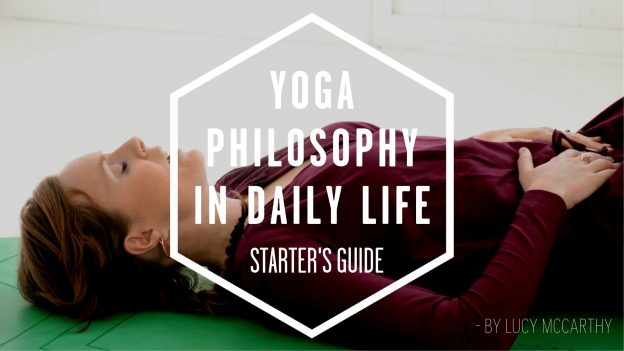
We’ve been catching up with Lucy McCarthy about how to start exploring yoga philosophy. Lucy spills the beans on how philosophy supports her to lead a happier, fulfilling and sustainable life.
What are your top three suggestions for a yogi’s approach to life?
1.Resistance is Futile!
A.K.A: go with the flow. This has been one of the greatest (and most challenging) and most ongoing lessons I have learnt in my yogic journey and from yoga philosophy. That when we resist what is happening in any moment we actually make it worse. I have noticed the resistance essentially arises due to the mind’s idea of how things ‘ought’ to be or how it ‘should’ be unfolding. This insistence is actually denying and rejecting what the moment has to offer.
When we find ourselves in this resisting place it feels awful; we tighten up; we tend to loose our sense of perspective and for sure our sense of humour; and it generally makes life much less sweet. Whereas, when you honour the deep eternal truth that yogis discovered millennia ago and more recently astrophysicists confirmed: that the nature of reality is that of constant flux and change. In other words, everything is impermanent.
Once we begin to truly understand this in an embodied way it allows us to soften into the present moment as it is. Trusting that if it is a challenging moment it will pass as that is the nature of change in the universe. I have learn this deeply through watching my mind in meditation. And have particularly inspired by the work of Buddhist teacher Tara Brach and her teachings around Radical Acceptance. In this practice, we practice say yes to everything that happens to us easy and sweet as well as challenging. And a we greet and welcome it all it allows us to stay open and soft and we begin to discover that even the toughest experiences can help us grow and evolve into our Highest Self and expression of who we are.
2.A little bit goes a long way
Start your day with awareness, breath and maybe some movement too. Even 5 minutes on waking up changes the whole of the rest of your day. When you commit to starting your day in this way it really communicates to yourself that you are making your inner and outer wellbeing and harmony a priority and in response often the outer universe meets that harmony with more of the same! I learnt this by trial and error! When I do practice and start my day with even a brief time of quiet and breath awareness my day flows so much sweeter. On the contrary when I don’t I really notice the difference!
3. Look for the good in everyone you meet
This is especially true of those that trigger you. Look for the commonalities between you rather than the differences. For me this is at the heart of living compassionately. Remembering that yoga means Union and in its truest expression this goes way beyond what we do on the mat. Finding and looking for the good in everyone allows us to find ways even small ones to be unified with others. Equally when we remember that each of us are human on this wild ride through life all experiencing heart break as well as joy. This remembrance softens our ego that likes to differentiate and compare. And as we soften and open ourselves to others we are usually pleasantly surprised to discover this being reciprocated. I learnt this wisdom through my study of Kashmir Shaivism and its beautiful life enhancing philosophy.
How do you personally apply yoga philosophy to your life?
I apply it everyday or at least am working on it everyday sometimes more successfully than others! In every interaction I have whether its with my daughter and husband or the shopkeeper or bus driver I have the intention of living my yoga. I try to create union in all I do, through the qualities of respect, compassion, honesty and simplicity amongst others. I try to embody yoga, being in a state of union in all my day-to-day interactions. This means being patient when my daughter presses my buttons, or someone in the street behaves rudely towards me.
It takes a lot of self-effort and presence to really stay aligned with my highest intentions of embodying yoga fully. When in relationships and conflict arises it is a real challenge to stay grounded and steady, having the courage to speak our truth with respect and with a sense of compassion for the person in front of us. I think day to day life is such a rich playground to practice applying yoga philosophy in our lives. I truly believe this is what the philosophy is for, to help guide us how to live more peacefully. The yamas and niyamas, inner and outer ethical principles, given in Patanjali’s Yoga Sutras continue to be a source of great inspiration to me in terms of right and peaceful living.
Yoga philosophy sounds complicated, what would you recommend as a first step?
One of the best things I ever learnt from one of my first teachers Max Strom is that people actually talk about ethics and philosophy all day long, we just don’t realise it. But if you were to sit and listen in to almost any conversation in a cafe you would likely hear people discussing ethics and philosophy just veiled in the form of complaining! For example ‘Can you believe she said that….’ ‘I can’t believe he treated me that way….’ etc. At the root of these conversations is people’s innate sense of right and wrong and the values they believe in. It is when these principles and values are stepped over or crossed by others that we get upset and end up complaining!
So actually we can begin to explore philosophy in a very personal way by beginning to notice when we are angered or hurt by others behaviours. What’s at the root of that anger? Has an internal line been crossed and what is it? What do you believe in and why? What is your inner belief system and why? And once you start to delve into it, it really becomes a fascinating journey of self inquiry which is one of the key pathways of yogic practices. Then once you start to get to know your own personal ethics better you are able to act and speak and move thru life in a more harmonious way. Try it and let me know how you get on!
Inspired? Try one Lucy’s philosophy based courses
Lucy has put together two courses for MFML which support you to explore different aspects of yoga philosophy. Flow Towards Freedom moves progressively through the ‘koshas’ or coverings to the soul. The Five Elements helps you to explore the different elements and their impact on your body.
About Lucy McCarthy:

Lucy McCarthy discovered yoga on a rooftop in India and hasn’t looked back since. After studying Hatha Yoga in India, Lucy trained with Max Strom. Lucy now has over a thousand hours of training under her belt and she teaches mindful, breath and alignment focussed flow yoga. Lucy places an emphasis on the practice as a healing and transformative sanctuary in our lives. Her classes inspire, uplift and provoke curiosity.





Pingback: Practical Yoga Philosophy: Unveiling Lesser-Known Principles - Life Trek Blog